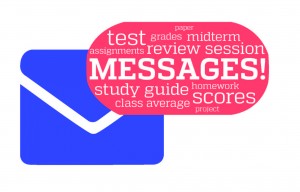A BYU instructor’s ability to use Learning Suite to contact students or an entire class by email is now a thing of the past.
“A new internal messaging system will replace email sending,” said a notice posted on Learning Suite on Oct. 18. The change caught some faculty and students off guard and is drawing mixed reactions as users learn about the change.
Learning Suite is the online academic forum BYU students and professors use to check and post grades as well as communicate and provide other course material. The new internal messaging system sends all professor and student emails to a Learning Suite account. This differs from the prior system in which messaging between professors and students went directly to a students personal email.

When this messaging system was first released, it was met with surprise and many questions. Students and professors were not sure what to make of the new envelope icon in the top right hand corner of their Learning Suite home page. Some students did not even know about the new feature until conversation began circulating around campus.
Adjunct professor Timothy Hawkes he noticed the system was just different one day.
“The new messaging system works fine; it’s clean and intuitive and it does what it is supposed to,” Hawkes said. “But I don’t have the confidence that it’s reaching students in a timely way.”
According to Larry Seawright, associate director of the Center for Teaching and Learning at BYU, there are a variety of reasons for the change to the messaging system. First, Seawright said the previous messaging system sent the email not from the user account of the faculty member but from the BYU Learning Suite user account so all replies went back to the system, not to the faculty member.
“Students complained that the email wouldn’t get to them,” Seawright said. “We never could guarantee to a faculty member that an email was sent to a student. Now the message is guaranteed to be there in the internal messaging system.”
The change also eliminates the chance a faculty member might use Learning Suite’s email function in violation of the Family Educational Rights and Privacy Act (FERPA), which protects the privacy of student education records. An internal messaging system meets FERPA regulations but sending a message that could be defined as an educational record through an email service does not.
According to Jearlene Leishman, FERPA compliance coordinator at BYU, information emailed to students by professors should only contain directory or generic information and should not contain any information specific to any student.
“Since BYU does not provide email to students that is within the BYU firewall, etc., all email to students must not contain confidential information,” Leishman said. “The U.S. Department of Education has told us the guideline to use is, would we include this on a postcard? If not, we shouldn’t include it in an email going outside the BYU domain.”
Records custodians are continually affected by technology changes.
“Years ago, most things that met the definition of ‘education record’ were stored in the registrar’s office on paper,” Leishman said. “Now there is so much more technology and more records that are distributed in more places. The definition of ‘education record’ under the law is very broad.”
However, FERPA does not seem to be the main concern of BYU students and faculty. Reactions to the early internal messaging system varied.
Brittany Feuz, a senior from Plymouth, Mich., majoring in human development, shared her reaction to the system. “I’ve had people trying to sell apartment contracts, cars, get people to like their band’s page and people arguing about the whole thing over messages,” Feuz said. “The system might be OK if people didn’t abuse it so much, but I prefer the old email system.”
On Nov. 12, Learning Suite added a feature allowing students to opt in to receive message notifications to their personal email. Students can now edit the settings of the messaging system, granting a release of their FERPA education records for each semester. Students may choose various options for receiving alerts about messages from professors and students.
Hayley Woolf, a sophomore from Lindon studying neuroscience, examined both sides of the issue.
“I feel like it’s good and more convenient,” Woolf said. “I don’t have to go through my email and dig through stuff. I think it’s annoying too because you get an alert anytime anyone replies to what the teacher says. It’s just as effective because students should go on the email and they should go on Learning Suite, so you should see it anyways.”




